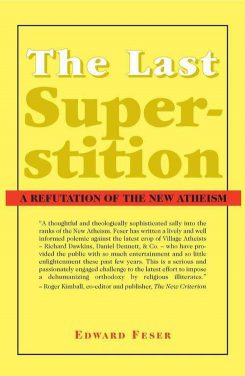The Last Superstition: Preface
I don’t remember where or how I ran across Edward Feser, a philosopher at Pasadena City College, but at some point I was told that he was a Serious Theologian, one of those people whose arguments atheists allegedly ignore. So I got his book The Last Superstition: A Refutation of the New Atheism at the library and read it.
I didn’t really think it would have any compelling arguments for God: if there were any, they’d have made the news by now. But I was hoping for something I could wrestle with, something that would make me think “Hm, this doesn’t seem quite right, but I can’t put my finger on any mistakes.” Unfortunately — spoiler alert! — it wasn’t that good. In fact, the question that came to mind most often was “Are you fucking kidding me?”
There’s so much bad in here, I thought I’d start a series of posts.
Preface and Acknowledgments
Feser begins his “Refutation of the New Atheism” by complaining about the 2008 California Supreme Court decision that gay people (or “homosexuals” as Feser insists on calling them) have as much of a “basic civil right” to marriage as straight people.
He calls gay marriage a “near total collapse of traditional morality”, “a metaphysical absurdity and a moral abomination” (p. ix). Of course, with the benefit of hindsight, we know that this collapse wasn’t quite as dire as predicted: California still hasn’t fallen into the sea, and as a DC area resident, I can attest that it is even possible to walk down Constitution Avenue without seeing the heads of conservatives impaled on pikes. So, bullet dodged.
Secularism, he tells us, is “a clear and present danger to the stability of any society, and to the eternal destiny of any soul, that falls under its malign influence” (p. x). I’m not sure whether he means secularism or atheism, because he tends to use the terms “atheist”, “secularist”, and “liberal” mostly interchangeably.
Feser pines for the good old days, when liberals were more conservative, atheists were in the closet, and gay people didn’t go around demanding rights all over the place.
If you are someone who agrees that these developments constitute a kind of madness, and want to understand how we have reached such a low point in the history of our civilization, you will want to read this book. If you are someone who does not regard them as madness, you need to read it – to see (if I may say so) the error of your ways, or, if that is not likely, then at least to understand the point of view of those who disagree with you. [pp. ix–x]
(Bold emphasis added; italics in the original).
So that’s that, then: I need to read this.
